by Gary Lord
Home - Genesis - 2007 - 2008 - 2009 - Early 2010 - Mid 2010 - Late 2010 - End 2010 - Early 2011 - Mid 2011 - Late 2011 - End 2011 - Early 2012 - Late 2012 - Early 2013- Late 2013 - 2014 - 2015 - Early 2016 - Late 2016 - 2017-19
Chapter Six: Mid 2010
In the months following Chelsea Manning’s May 2010 arrest, the US government empaneled a secret Grand Jury to investigate WikiLeaks and Julian Assange. Grand Juries were first established by England’s King Henry II in 1166. The United States is one of only two nations that still utilize the antiquated system (the other being Liberia in Africa). The Fifth Amendment to the United States Constitution states:
"No person shall be held to answer for a capital, or otherwise infamous crime, unless on a presentment or indictment of a grand jury …"
Neither the targets of a US grand jury nor their lawyers have a right to appear before the grand jury unless they are invited, nor do they have a right to present evidence. In 2009, out of 69,254 US grand jury suspects, only 20 were not indicted. And if a grand jury does not indict, the prosecutor can simply impanel a new grand jury. Hence the popular US lawyers joke: "a grand jury could indict a ham sandwich".
By the end of 2010, the WikiLeaks Grand Jury had likely already produced a secret sealed indictment charging Julian Assange with conspiracy to hack into a classified US government network.
- NOTE
-
When an indictment is sealed, all associated information is made secret. Once a defendant is arrested, the sealed indictment then becomes publicly unsealed at arraignment. So the defendant has no idea about the waiting allegations until after they are arrested and most likely jailed.
While US grand juries are re-empaneled every few years, with indictiments regularly refreshed, details of the Grand Jury are exposed by the codes used to identify it. Assange lawyer Michael Ratner later explained the meaning of a code ("11-3/ 10GJ3793/ 11-937") marked on a subpoena related to the investigation:

Grand Jury’s number is “10” standing for the year it began. “GJ” which is Grand Jury and then 3793. “3” is the Conspiracy Statute in the United States. “793” is the Espionage Statute.
The existence of a sealed indictment was routinely denied until Julian Assange was arrested by London police in April 2019, and the original US "computer intrusion" charge, which carried a maximum five years jail, was publicly revealed. A month later, the US government would announce seventeen additional charges, all related to Assange’s involvement with Chelsea Manning, amounting to a maximum 175 years jail.
*
Afghan War Logs
The last day of June 2010 was the first day of a momentous three day gathering at the Guardian offices in London. WikiLeaks boss Julian Assange was meeting up with five journalists - John Goetz from Germany’s Der Spiegel, Eric Schmitt from the New York Times, and the Guardian’s David Leigh, Nick Davies and Rob Evans - to examine the leaked material that would later be known as the Afghan War Logs (originally the "Afghan War Diary"). Their meeting room soon became the highly secretive new project’s "bunker".
According to John Goetz, they also wanted to "come up with a plan on how to coordinate journalistic cooperation between the partners."
Assange was concerned by how much high-level pressure WikiLeaks had received after the publishing of "Collateral Murder". He felt that it would be safer to partner with established media organisations in order to release the rest of the Manning leaks, but he only wanted to work with journalists he could trust. There was a clear benefit to the media organisations involved: exclusive access to a treasure trove of leaks, with journalists from various regions publishing explosive stories related to their own countries. In return, WikiLeaks expected these journalists to help sift through the mountains of data, and publish their articles responsibly. As John Goetz said:
"I discussed in detail with Assange in London how documents might be vetted to prevent risk of harm to anyone. He was in agreement as to the importance of protecting confidential sources including certain US and ISAF [International Security Assistance Force, the NATO-led military mission in Afghanistan] sources."
Goetz said this careful approach to redaction was "understood and agreed by all the media partners" and efforts to keep the data secure were "more extreme… than I had ever previously observed as a journalist". He said someone from the Guardian put the complex US military database content into a Microsoft Excel format, making it easier to read, but the work was still "extraordinarily demanding".
"The scope was overwhelming and demands upon all involved were enormous and stressful for a range of reasons."
Prior to the release, Eric Schmitt of the New York Times contacted the White House for comment. He later emailed Goetz to say the Obama administration had requested that WikiLeaks and their partners redact the names of informants and withhold 15,000 documents from publication. WikiLeaks subsequently noted on their release page:
"We have delayed the release of some 15,000 reports from the total archive as part of a harm minimization process demanded by our source. After further review, these reports will be released, with occasional redactions, and eventually in full, as the security situation in Afghanistan permits. "
The plan was for all the media partners to publish at the same time (so that the US government could not signal out one organisation to blame) with stories linking back to the verifiable data on the WikiLeaks website. But Goetz said Der Spiegel and the Guardian ended up publishing before WikiLeaks:
"The Guardian published a couple of hundred documents on their site before WikiLeaks. WikiLeaks has some technical delay and their Afghan War Diary website did not go live for a couple of hours after we did."
On 25 July 2010, WikiLeaks published the Afghan War Diary: 75,000 documents (of the original 91,000) covering a period between January 2004 and December 2009. Julian Assange called it "the most comprehensive history of a war ever to be published, during the course of the war - in other words, at a time when they still have a chance of doing some good." He said the leaked documents would "change our perspective on not only the war in Afghanistan, but on all modern wars."
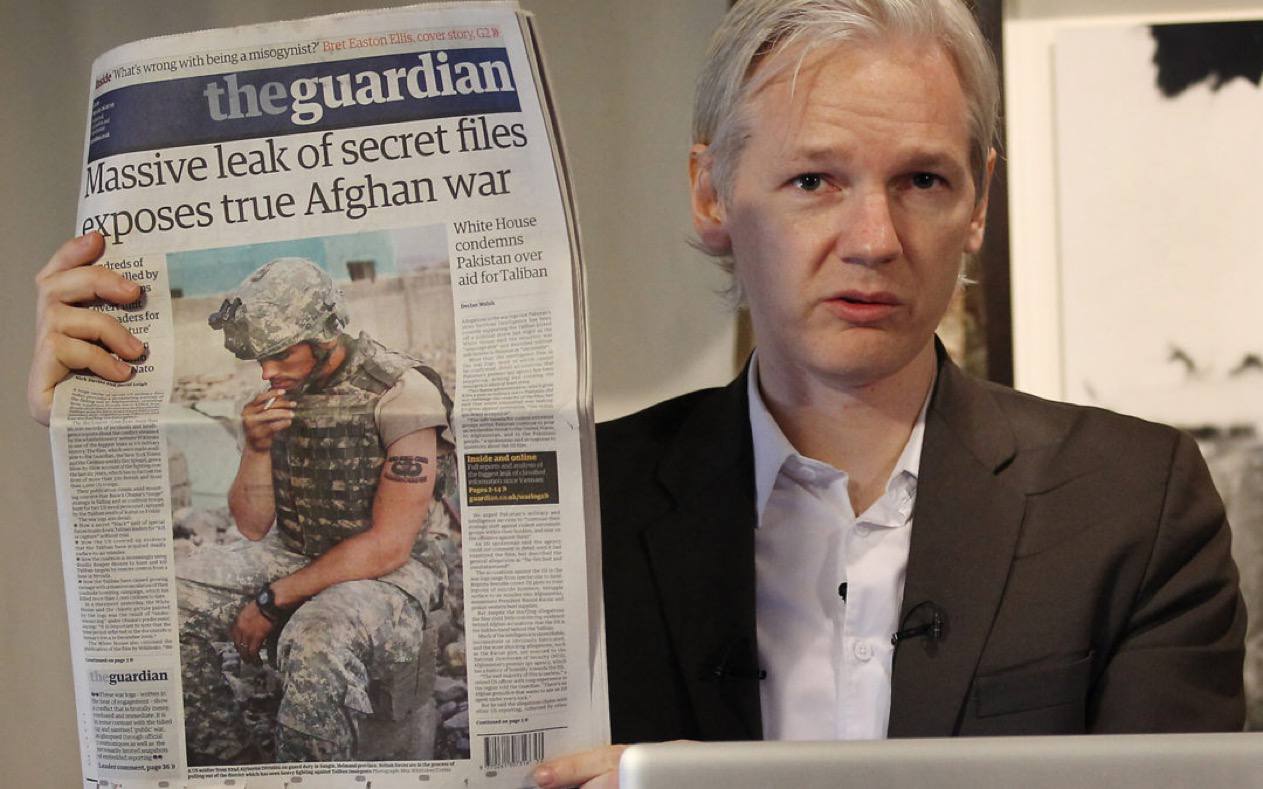
A Guardian editorial called the leaks an "unvarnished picture" of a nine year old war that "cannot be won like this":
"We today learn of nearly 150 incidents in which coalition forces, including British troops, have killed or injured civilians, most of which have never been reported; of hundreds of border clashes between Afghan and Pakistani troops, two armies which are supposed to be allies; of the existence of a special forces unit whose tasks include killing Taliban and al-Qaida leaders; of the slaughter of civilians caught by the Taliban’s improvised explosive devices; and of a catalogue of incidents where coalition troops have fired on and killed each other or fellow Afghans under arms."
The leaks also revealed incidents of child prostitution by US Defence contractors, and psychological warfare waged via Afghan media outlets.
In the months ahead of this release, President Obama had ordered a contoversial "surge" of new US forces in Afghanistan. He blamed his predecessor, President Bush, for the chaos the leaks revealed:
In a statement, the White House said the chaotic picture painted by the logs was the result of "under-resourcing" under Obama’s predecessor, saying: "It is important to note that the time period reflected in the documents is January 2004 to December 2009."
The White House also claimed that WikiLeaks had "made no effort to contact the US government about these documents." This simply was not true: the media partners had agreed that the New York Times should handle discussions with the US government "because if all the partners contacted the White House independently, there would be chaos".
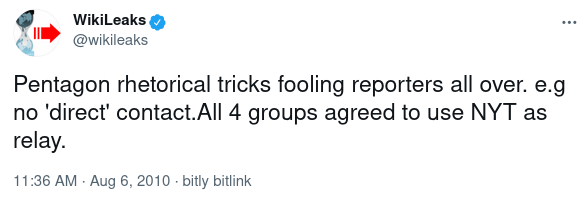
The US government further claimed that the disclosure of this classified information "puts the lives of the US and partner service members at risk and threatens our national security". This claim would be repeated endlessly for years to come, but no solid proof of harm was ever supplied. A letter from US Defence Secretary Robert Gates, dated 16 August 2010 but only revealed months later, admitted that the documents leaked by the WikiLeaks did not in fact jeopardize any US intelligence or sensitive military operations.
When US prosecutors ended up in court years later, they could not point to a single incident where anyone had been harmed as a result of WikiLeaks publications. They noted that the Taliban had responded to the release of the Afghan War Logs by publicly stating that they were reviewing the leaks to identify spies whom they could “punish". Assange dryly responded that this that was entirely expected, and that is why names had been redacted. A Senate Committee on Armed Services reported in August 2010 that “the review to date has not revealed any sensitive sources and methods compromised by disclosure”. And in October 2010 a senior NATO official in Kabul told CNN that there had not been a single case of Afghans needing protection or to be moved because of the leak.
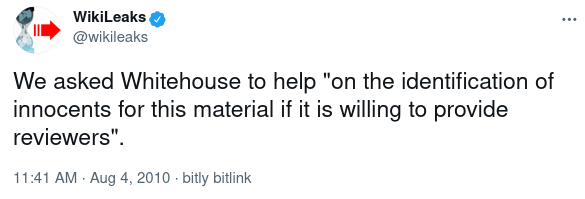
Within days of the Afghan War Logs release, US Defence Secretary Robert Gates phoned FBI Director Robert Mueller and asked the FBI to assist in their investigation of WikiLeaks and Julian Assange. WikiLeaks said the US Department of State’s Diplomatic Security Service was also involved in the investigation.
On the following day, WikiLeaks added an AES-encrypted "insurance file" to the Afghan War Diary page. The 1.4 GigaByte file, with a timestamp of 31 December 2010, was twenty times larger than the just-released Afghan War documents. Cryptographers said it would be virtually impossible to crack unless WikiLeaks revealed the password. Within weeks, the file had been downloaded over 100,000 times, and WikiLeaks was boasting over 100,000 followers on Twitter alone.
On the same day (29 July 2010) Britain’s House of Commons announced that they would hold two inquiries into the Afghan War:
Commons' defense committee said in a statement that the first inquiry would examine whether it was justifiable for Britain to remain involved in the nine-year-old unpopular war. It will also examine reports of civilian casualties and a timetable for withdrawal.
The statement said the second inquiry would consider ways to find a political settlement in Afghanistan.
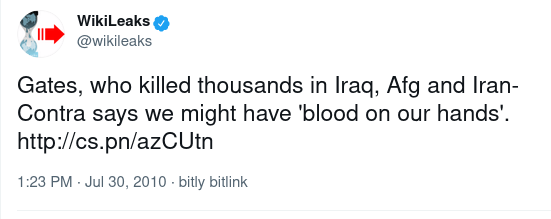
In media interviews, Julian Assange bristled at claims he had "blood on his hands".
"There is a legitimate role for secrecy, and there is a legitimate role for openness. Unfortunately, those who commit abuses against humanity or against the law find abusing legitimate secrecy to conceal their abuse all too easy… Reform can only come about when injustice is exposed."
SPIEGEL: During the Vietnam War, US President Richard Nixon once called Daniel Ellsberg, the leaker of the Pentagon Papers, the most dangerous man in America. Are you today’s most dangerous man or the most endangered?
"The most dangerous men are those who are in charge of war. And they need to be stopped. If that makes me dangerous in their eyes, so be it."
SPIEGEL: You could have started a company in Silicon Valley and lived in a home in Palo Alto with a swimming pool. Why did you decide to do the WikiLeaks project instead?
"We all only live once. So we are obligated to make good use of the time that we have and to do something that is meaningful and satisfying. This is something that I find meaningful and satisfying. That is my temperament. I enjoy creating systems on a grand scale, and I enjoy helping people who are vulnerable. And I enjoy crushing bastards. So it is enjoyable work."
*
In the Washington Post newspaper, former Bush speechwriter Marc Thiessen, a senior member of the Neoconservative "American Enterprise Institute", branded WikiLeaks “a criminal enterprise” and urged the military to hunt them down like terrorists. In retrospect, his article set out a roadmap which US administrations largely maintained for the following decade.
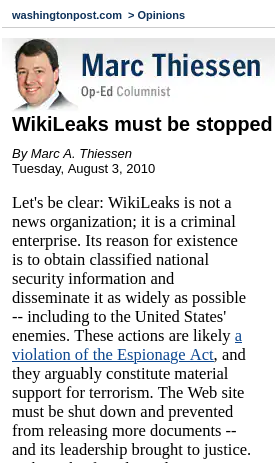
Assange is a non-U.S. citizen operating outside the territory of the United States. This means the government has a wide range of options for dealing with him. It can employ not only law enforcement but also intelligence and military assets to bring Assange to justice and put his criminal syndicate out of business.
The first step is for the Justice Department to indict Assange. Such an indictment could be sealed to prevent him from knowing that the United States is seeking his arrest. The United States should then work with its international law enforcement partners to apprehend and extradite him.
Thiessen said the USA should pressure foreign governments to "cooperate in bringing Assange to justice".
But if they refuse, the United States can arrest Assange on their territory without their knowledge or approval.
He cited a 1989 memorandum from the US Justice Department’s Office of Legal Counsel as proof that this would be legal: "we do not need permission to apprehend Assange or his co-conspirators anywhere in the world".
Karl Rove, Bush’s former Senior Advisor, applauded Thiessen’s article and challenged President Obama to "stop WikiLeaks". He said he wanted Assange "hunted down and grabbed". Michigan Congressman Mike Rogers, a Republican on the House Intelligence Committee, said Private Manning should be executed if it was proved she leaked the documents to WikiLeaks.
*
WikiLeaks staff were now being actively targeted by the US government. In early June 2010, Assange was scheduled to join Daniel Ellsberg on stage in New York but appeared via Skype from Australia instead, saying lawyers recommended he not return to the USA. On 11 June 2010 The Daily Beast reported that Pentagon investigators were trying to determine his whereabouts.
American officials would not discuss the methods being used to find Assange, nor would they say if they had information to suggest where he is now. "We’d like to know where he is; we’d like his cooperation in this," one U.S. official said of Assange.
Investigators may get their chance Friday night, when Assange is scheduled to appear at an Investigative Reporters and Editors conference in Las Vegas. Whether he will physically appear at the conference is anyone’s guess.
Assange cancelled his appearance at the Las Vegas conference due to security concerns, but was still scheduled to deliver the keynote speech at a a major New York conference called Hackers on Planet Earth (HOPE). On the day before the Wikileaks Editor in Chief was scheduled to speak, five Homeland Security agents appeared at the conference.
A conference security staffer said that after being told they needed search warrants to enter the event, at least two agents paid the $100 admission fee to get in.
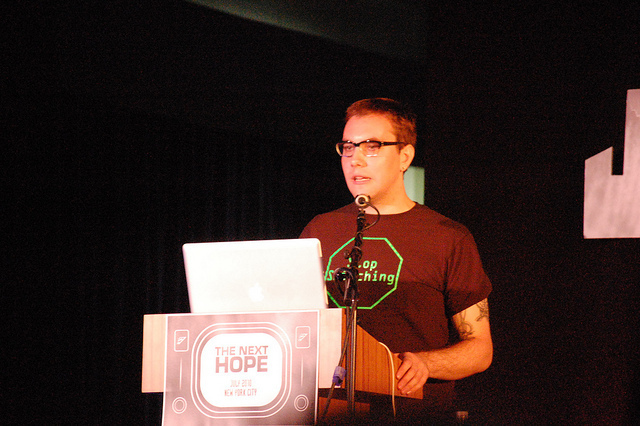
Instead of Julian Assange, the federal agents in New York got to hear 27-year-old Jacob Appelbaum, a US citizen and close confidant of Assange, who later said he had been "working with WikiLeaks for about three months". Appelbaum’s speech was a perfect example of his scathing humour and passionate concern:
“Hello to all my friends and fans in domestic and international surveillance,” Appelbaum began. “I am here today because I believe we can make a better world. Julian, unfortunately, can’t make it, because we don’t live in that better world right now, because we haven’t yet made it. I wanted to make a little declaration for the federal agents that are standing in the back of the room and the ones that are standing in the front of the room, and to be very clear about this: I have, on me, in my pocket, some money, the Bill of Rights and a driver’s license, and that’s it. I have no computer system, I have no telephone, I have no keys, no access to anything. There’s absolutely no reason that you should arrest me or bother me. And just in case you were wondering, I’m an American, born and raised, who’s unhappy. I’m unhappy with how things are going.” He paused, interrupted by raucous applause. “To quote from Tron,” he added, “‘I fight for the user.'”
After the speech, Appelbaum slipped out a backstage door, using a decoy to distract the federal agents, and went straight to the airport, where he boarded a flight to Berlin two hours later. When he returned to the USA on 29 July 2010, Appelbaum was detained by US customs officers at Newark Liberty airport. Officials photocopied his receipts, confiscated his phones and laptop, then interrogated him for three hours. Pressed for information on Assange and WikiLeaks, or his opinions on the wars in Afghanistan and Iraq, Appelbaum refused to talk.
Meanwhile, Julian Assange had made a surprise appearance on stage at a TED Talk in Oxford, where he received a standing ovation. Host Chris Anderson asked Assange if it was true that WikiLeaks in recent months had "released more classified documents than the rest of the world’s media combined".
"Yeah, can it possibly be true?" replied Assange. "It’s a worry - isn’t it? - that the rest of the world’s media is doing such a bad job that a little group of activists is able to release more of that type of information than the rest of the world press combined."
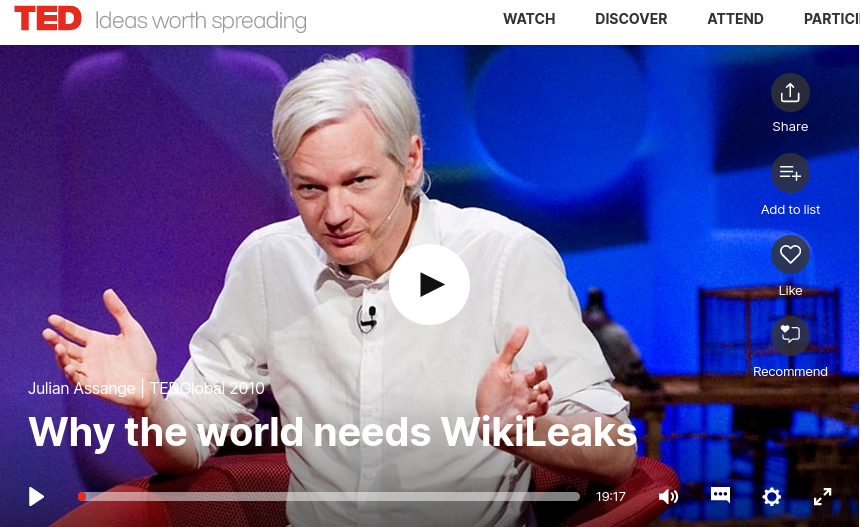
Assange repeated that he did not know if Chelsea Manning was WikiLeaks' source.
“We’re using state-of-the-art encryption and anonymizers to get information. And we get submissions by mail, regular postal mail. If we happen to find out the identity of a source, we destroy that information.”
Nevertheless, WikiLeaks continued urging public support for Manning.

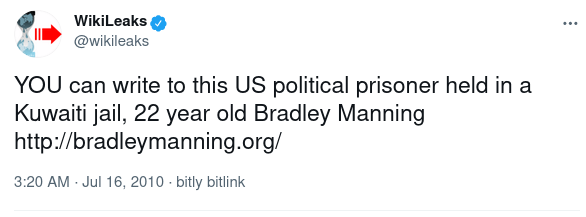
At about the same time, FBI agents were in Wales, raiding the house of Manning’s seriously ill mother, who had speech difficulties following a stroke four years earlier. The story was only revealed a month later.
Mr Manning’s aunt Sharon Staples told how her sister Susan, 56, pleaded for help down the phone, sobbing: "They’re here, they’re here."
Assange later stated that it was this FBI raid that motivated his decision to go and visit Sweden: "the FBI was here in the UK, stomping around the UK, and we thought I’d better get out."
*
Even prior to the Afghan War Logs release, WikiLeaks was still busy fending off mounting public criticism. The Wau Holland Foundation in Germany was forced to clarify how they handled donations to Wikileaks. And Assange, who had just been rated the 58th Most Powerful Person in Global Media, continued demanding more from his media colleagues.
"Journalism should be more like science," he told one Guardian interviewer (who then described Assange as "a bit odd… cadaverous… like Andy Warhol").
"As far as possible, facts should be verifiable," said Assange. "If journalists want long-term credibility for their profession, they have to go in that direction. Have more respect for readers."
Assange complained that journalists all too frequently burned their sources without taking any personal risks. Rather provocatively, he compare the death rate of Western journalists with media casualties in more authoritarian regimes:
"I think it’s an international disgrace that so few western journalists have been killed in the course of duty, or have been arrested in the course of duty. How many journalists were arrested last year in the United States, a country of 300 million people? How many journalists were arrested in the UK last year?"
On the other hand, Assange rushed to support responsible and courageous journalism. When a Professor of Law at Kings College unfairly attacked the BBC over their handling of the Trafigura affair, Assange publicly humiliated him on stage.

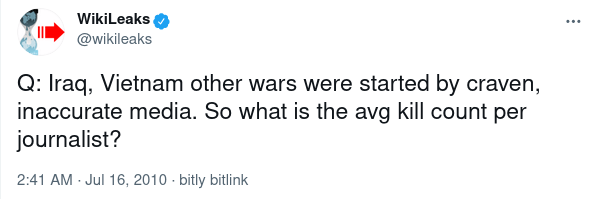
*
A Pew Reseach poll conducted between 29 July and 1 August 2010 found that younger US citizens were more likely to approve of WikiLeaks disclosing classified material. Pew reported that "attention to news from Afghanistan spiked following the WikiLeaks report, with 34% following Afghanistan reports very closely, up from 22% the previous week. This is the highest interest in Afghanistan news since December 2009."
Most Americans have heard either a lot (37%) or a little (36%) about the WikiLeaks story specifically, though 27% say they heard nothing at all about it. Among those who have heard about the leak, 47% say the disclosure of classified documents about the war in Afghanistan harms the public interest while 42% say it serves the public interest.
41% of respondents said the Afghan War Logs had received too little US media coverage in a week where Chelsea Clinton’s wedding had dominated the headlines.
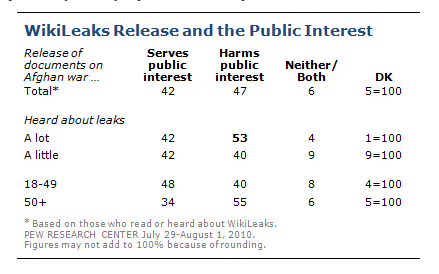
On 3 August 2010 a USA Today/Gallup poll showed a dramatic 12 percent fall in public support for President Obama’s handling of the Afghan war:
Only 36% backed Obama’s war policies, down from 48% in February… The poll attributed the loss of support for the war to the rising U.S. death toll and last week’s massive document dump of classified material by WikiLeaks, which highlighted internal disputes on strategy… 43% agree the war in Afghanistan also was a mistake.
*
These political shifts vindicated Chelsea Manning’s decision to turn whistle-blower - but who was going to tell her about them? While the polls above were being conducted, Manning was being transferred from her hot prison cage in Kuwait to the US Marines' Quantico detention facility in Virginia. Guards in Kuwait had claimed that she had made a noose from her bedsheets, and repeatedly banged her head against the cage (she later could not remember this) so they placed her on suicide watch and prescribed anti-depression and anti-anxiety drugs. She remained on suicide watch in maximum security conditions at Quantico, but initially thought things were getting better:
"It wasn’t the ideal environment in Quantico. But it had air conditioning, solid floors, hot and cold running water. It was great to be on continental United States soil again."
In fact Manning would endure conditions amounting to torture for another nine months at Quantico: a guard stationed permanently outside her 6ft by 8ft (180cm by 240cm) cell; a toilet with no toilet paper (she had to shout for it when needed); only 20 minutes per day outside the cell, in full restraint (hands cuffed to a leather belt, legs in irons); nights spent under observation in fluorescent light, with guards regularly banging on the door for "security checks".
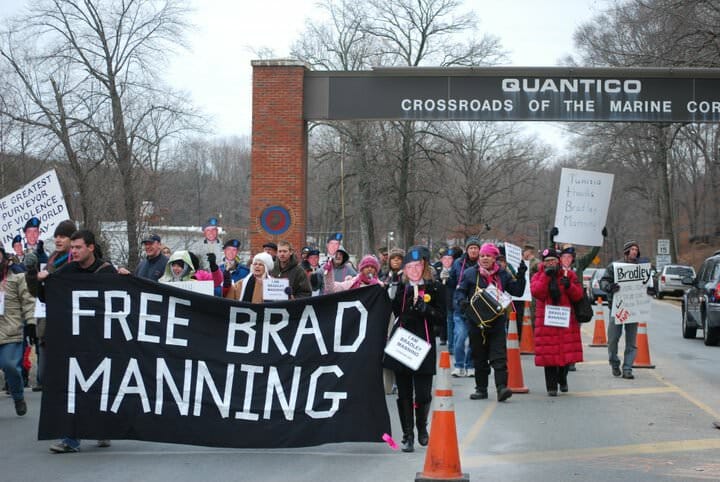
*
The release of the Afghan War Logs was still causing absurd levels of chaos in Washington. Voice of America employees were told that they were not allowed to read or e-mail any of the WikiLeaks material on their government computers - even though they were expected to report on it! US soldiers were also ordered not to read or share WikiLeaks documents, with the US Navy’s Judge Advocate General’s Corp insisting that the leaked information remained officially classified - even though it was now in the public domain. And Democrat Senators Charles Schumer and Dianne Feinstein, who were drafting new legislation to protect journalists from revealing sources, hurriedly authored amendments to ensure that such protection would never be afforded to WikiLeaks.
"WikiLeaks should not be spared in any way from the fullest prosecution possible under the law," said Schumer. "Our bill already includes safeguards when a leak impacts national security, and it would never grant protection to a website like this one, but we will take this extra step to remove even a scintilla of doubt."
Not everyone was unhappy with the new leaks. As Daniel Ellsberg told CNN’s Larry King:
"There hasn’t been an unauthorized disclosure of this magnitude since the Pentagon Papers 39 years ago. I’ve been waiting for it for a long time."
King: How do you respond to the White House assertion that this leak puts U.S. forces in danger?
"You know, the people who put U.S. forces in harm’s way — 100,000 men and women in Afghanistan — are the last two administrations, but particularly this one, with a decision to escalate the war. I think it takes a lot of – I don’t know what to say — chutzpah, effrontery, for people who made the reckless, foolish, and I would say irresponsible decisions to escalate a war that I’m sure they know internally is as hopeless as these new revelations reveal it to be."
The US Department of Defence ominously threatened to take action against WikiLeaks if they did not return the leaked data:
"We want whatever they have returned to us and we want whatever copies they have expunged… We demand that they do the right thing. If doing the right thing is not good enough for them, then we will figure out what alternatives we have to compel them to do the right thing."
WikiLeaks tweeted that the threat was "obnoxious". They said journalists were being fooled by the Pentagon’s "rhetorical tricks" about their lack of "direct" contact with the US government (after WikiLeaks media partners had agreed to let the New York Times handle contact), and the White House had refused their offer to help redact documents. They also complained that their media partners were not helping with redactions.
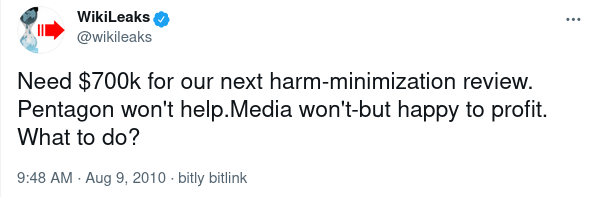
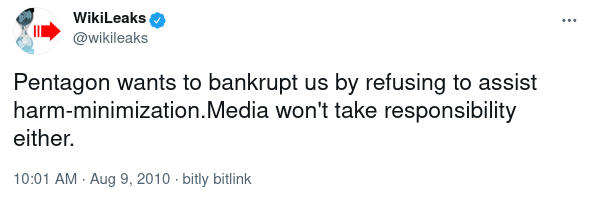
This was a sly reference to behind-the-scenes negitiations as WikiLeaks worked on their next big release, the Iraq War Logs (see below). WikiLeaks was demanding more time to redact documents. According to Der Spiegel’s John Goetz, their media partners were irritated by the delay.
On 2 August 2010, senior Guardian editor David Leigh sent the following email to Goetz:
"WikiLeaks says they require more time because they have a team attempting to redact bad stuff. They’re not going to publish for quite a while now."
With the benefit of hindsight, this media frustration is supremely ironic: Leigh was just one of many journalists who later falsely accused Assange of "putting lives in danger" by publishing unredacted documents.
What to do? WikiLeaks retweeted a follower who seemed to have the best response: lives were being lost every day on the battlefields of Iraq and Afghanistan; perhaps the best WikiLeaks could do was publish and be damned.
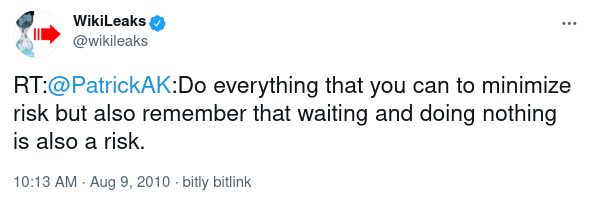
On 12 August 2010, Assange appeared via Skype at an event hosted by London’s Frontline Club: "How WikiLeaks Is Changing Journalism". Tensions between WikiLeaks and its media partners were immediately apparent. Assange said the New York Times' portrayal of Chelsea Manning was "disgusting". He said WikiLeaks were still only "half way" through the process of redacting the remaining the 15,000 documents that had been withheld from the Afghan War Logs release.
"So far there has been no help despite repeated requests, from the White House or the Pentagon, or in fact any of the three press organisations we partnered with for this material," said Assange, who added that the cost could be up to £750,000. "They decided not to take responsibility for getting the raw data out to the public, that is in fact what appears our role, to get the raw data out as opposed to the cherries the organisations decided selectively to give out in relation to their stories."
The Guardian’s Simon Rogers said they had thought "long and hard" about publishing the raw data but "on the legal side we are based in London and you can find us." Media lawyer Mark Stephens suggested the Guardian might need to restructure, like WikiLeaks, moving key resources to more "sympathetic jurisdictions" such as Iceland.
Assange asked how the world’s media was planning to respond to the Pentagon’s recent threats against WikiLeaks:
"Is it going to be a serious response or is it going to simply put its head in the sand?"
Within ten days the answer would be obvious. WikiLeaks was about to be hit with a bombshell. And the world’s media would soon have a perfect excuse to desert Assange en masse.
Swedish Sex Allegations
Until August 2010, the WikiLeaks website was hosted by a Swedish company called PRQ, which provided "highly secure, no-questions-asked hosting services". In keeping with the anarchistic approach to a free Internet, PRQ recorded "almost no information about its clientele" and maintained "few if any of its own logs". Julian Assange still believed that Swedish laws guaranteed the world’s most secure Internet hosting, but he wanted to move WikiLeaks to another Swedish Internet Service Provider named Bahnhof, who housed their servers in the Pionen facility, a former underground nuclear fall-out shelter. Assange was also planning to apply for Swedish residency ahead of WikiLeaks’ Iraq War Logs publication.
But on the morning of 21 August 201, Julian Assange woke up in Stockholm to find himself branded a "Double Rapist" on media front pages around the world. So how did that happen?
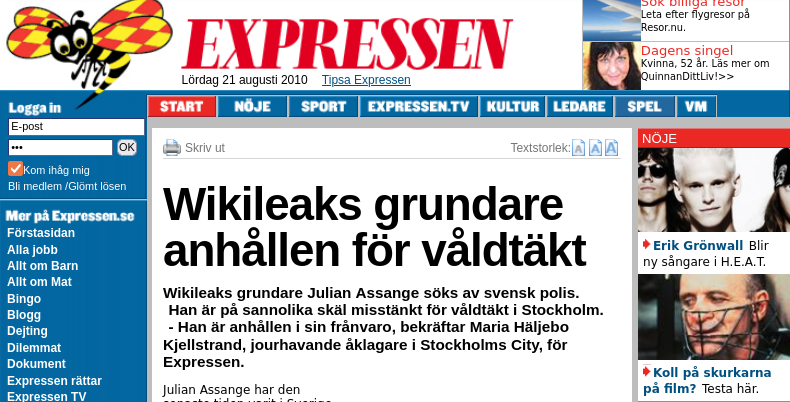
- NOTE
-
The information in this section is largely gathered from an excellent investigation by ABC Four Corners, "Sex, Lies And Julian Assange". Also a detailed article by Swedish-speaking Australian journalist Guy Rundle, "Crayfish Summer", that includes a close reading of Swedish police reports. Plus evidence compiled by retired Swedish businessman Goran Rudling, a campaigner for rape law reform. Also the Agreed Case Facts and Assange’s own testimony and evidence supplied by his legal team, which unfortunately was never tested in court because Swedish prosecutors never actually charged Assange with any crime.
On 11 August 2010, Assange landed in the Swedish capital to give a speech and negotiate a deal with Bahnhof. He was invited by a woman named Anna Ardin to stay at her apartment, which she said would be empty. Assange later explained that they had been introduced by "political contacts in Sweden". So who was Anna Ardin? According to Rundle:
Anna Ardin, 31, was the press secretary of the Brotherhood Movement, a once-conservative Christian group within the Swedish Social Democratic Party, now a centre for ‘third-worldist’ left liberation theology. Known for her exuberant enthusiasms, Ardin was or had been variously a feminist, a gender equality officer for the Uppsala University student union, an Israel–Palestine peace activist, an animal liberationist and the co-proprietor of Fever, a bisexual fetish nightclub.
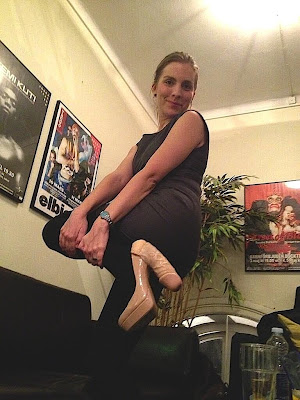
Ardin had also worked with US-backed opposition groups in Cuba and Miami, fleeing from Havana after being threatened with deportation for "subversivee activities", and wrote anti-Castro articles for a US-linked publication in Sweden.
Two nights after Assange arrived, on Friday 13 August, Ardin returned home but told Assange he was welcome to stay. She had consensual sex with him that night. Ardin later told police that a condom had broken during sex but Assange had continued having sex with her, against her wishes. Assange told police that she had never mentioned this to him, and that they had continued having intercourse the next morning and the next day. Ardin continued happily socialising with Assange for days, and insisted he stay at her house, despite other offers of accommodation.
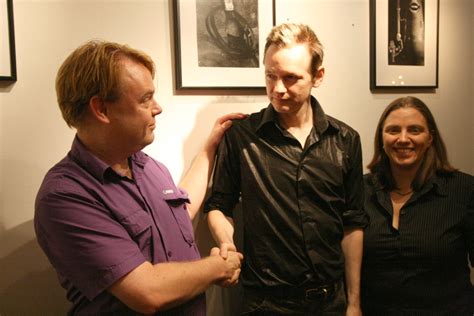
On Saturday 14 August, Assange gave a speech at Stockholm’s Trade Union Headquarters, where Ardin acted as his press secretary. She later tweeted that Assange wanted to attend a late night crayfish party. In the early hours of Sunday morning she tweeted from the party:
"Sitting outdoors at 02:00 and hardly freezing with the world’s coolest smartest people, it’s amazing!"
Five days later, these tweets had mysteriously been deleted.
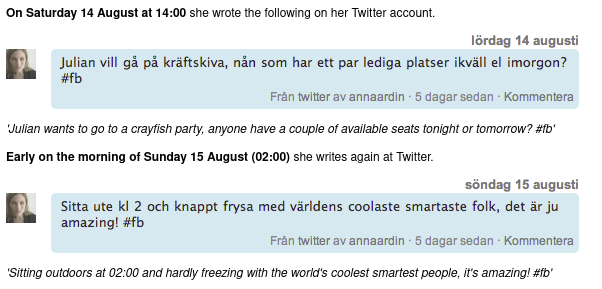
Ardin later tweeted (in Swedish on 22 April 2013) that she was "not raped". That tweet was also deleted.
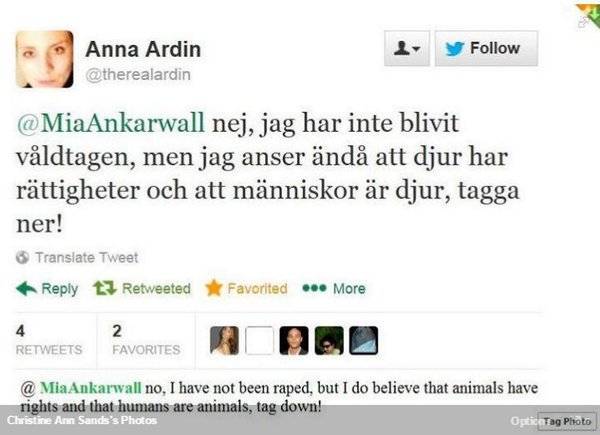
Another Swedish woman, Sofia Wilén, was in the front row of the Trade Union HQ audience on Saturday, wearing a pink cashmere sweater and taking photos of Assange. During Assange’s speech, according to text messages later produced by Assange’s lawyers, Wilén texted a friend: "He looked at me!" Wilén later told police she had become interested in Assange after seeing him on TV.
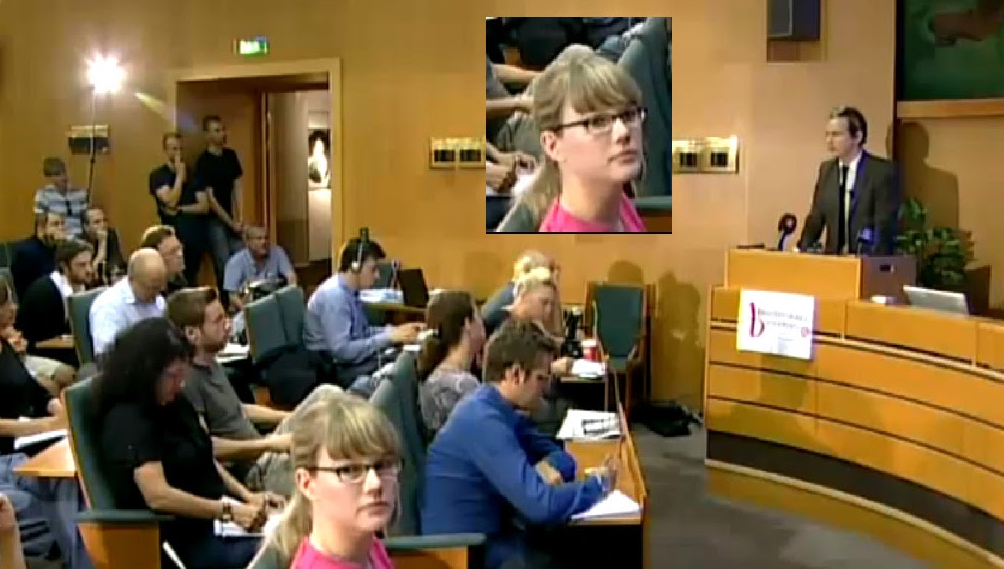
Witnesses said that following Assange’s speech, Sofia Wilén pressured her way to an invite to the post-event lunch, where she flirted with Assange, who later said "one of the organizers stated that she was a volunteer for their organisation although they would later claim that this was not true". After lunch, Wilén and Assange went to an IMAX cinema together and "canoodled". Assange said she "kissed me and placed my hands on her breasts. She asked whether I was staying with [Anna Ardin] and seemed concerned by it in a manner that I found strange."
Two days later, on Monday August 16th 2010, Assange and Wilén caught a train from Stockholm’s central station to her flat in Enköping. Assange’s bank cards had been frozen, so Wilén paid for his ticket. They had consensual sex and Assange stayed the night, believing he was in a secure location even though Wilén "knew an unusual amount of detail about me".
"I would later discover that she had collected dozens of photos of me in the weeks before we even met. Her recent FLICKR photo account was filled with pages and pages of photos of me and no other person."
The next morning, according to Rundle’s version, "something happened".
Wilén would tell police that Assange began bareback [no condom] sex with her while she was asleep. As she woke, she said, “You better not have HIV,” to which he replied, “Of course not.” And they continued. According to Assange’s version, Wilén was half-asleep when sex began. Assange’s defence team would later allege that in a text message to a friend, Wilén also said she was half-asleep at the time.
According to Assange:
"I was certain "SW" was not asleep. I was also certain she expressly consented to unprotected sex before such intercourse started."
On Tuesday 17 August, Ardin allegedly texted a friend who was looking for Assange: “He’s not here. He’s planned to have sex with the cashmere girl every evening, but not made it. Maybe he finally found time yesterday?”
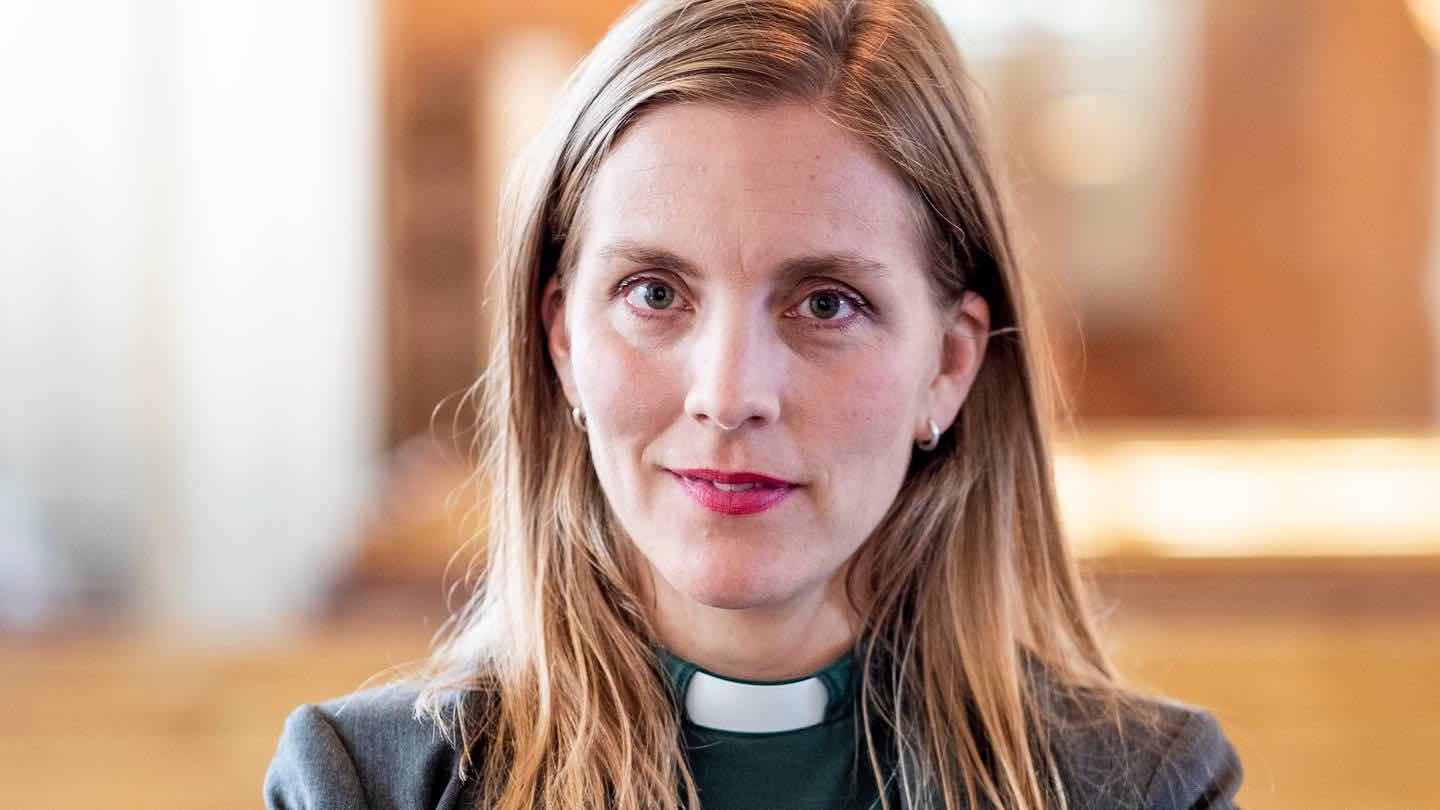
- NOTE
-
It’s worth noting here that in January 2010 Ardin had posted a 7 Step Guide to Revenge on her blog, including, for example, sabotaging a victim’s sexual relationships.
After having sex with Julian Assange, Sofia Wilén told friends that she was worried about the possibility of contracting a Sexually Transmitted Disease (STD). She phoned Ardin’s house, reportedly trying to contact Assange, and the two women began exchanging information. Ardin then introduced Wilén to a friend, Irmeli Krans, who was a former council election colleague and a campaigning feminist police officer. Like Ardin, Krans was also a member of Sweden’s Social Democratic party (this will be important later).
On Friday 20 August, Assange says he phoned Wilén because a friend said she was in hospital and wanted to talk to him. She asked him to meet her and get tested for an STD infection but "I was busy that day attempting to deal with the escalating political and legal threats against me from the Pentagon". Assange offered to get tested the following day (Saturday) but Wilén said she would go to the police and force him to get tested if he did not come to the hospital. After further discussion, Assange said she had agreed to meet at lunch the next day, when he agreed to get tested.
"You can imagine my disbelief when I woke the next morning to the news that I had been arrested in my absence for "rape" and that police were "hunting" all over Stockholm for me."
So what happened? After speaking on the phone with Assange on 20th August, Wilén went to Klara Police Station with Anna Ardin and policewoman Irmeli Krans, purportedly to force Julian to take an AIDS test. But Wilén said she was "shocked" and "railroaded" by police. Contrary to normal police procedures, Anna Ardin was allowed to sit in throughout Wilén’s police interview, which was also not video recorded (as per police recommendations) although a police report was produced.
Krans prepared a statement accusing Assange of rape but Wilén refused to sign it. The police report said she was "upset" by the rape accusation and left the station.
Wilén allegedly texted a friend at 14.25 on 20 August: “I did not want to put any charges against JA but the police wanted to get a grip on him.” At 17.26 another text said she was “shocked when they arrested JA because I only wanted him to take a test”. And the next day: “it was the police who fabricated the charges”.
These text messages were recorded by Swedish police but never made public. Assange’s lawyers were never given a copy but were "permitted to see them at the police station and able to note down a number of them":
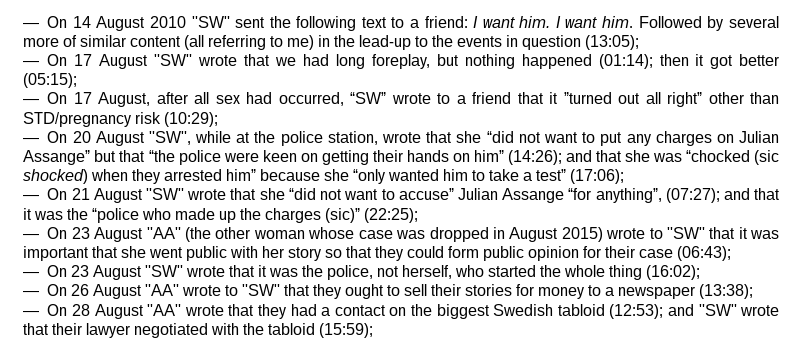
Next day, Saturday 21 August, Ardin made her own statement to the police. When asked to provide additional evidence, Ardin allegedly returned to the police station with a torn condom (which would by then have been over a week old). Police later tested the condom and found it had no traces of genomic DNA. In other words, it had never been used.
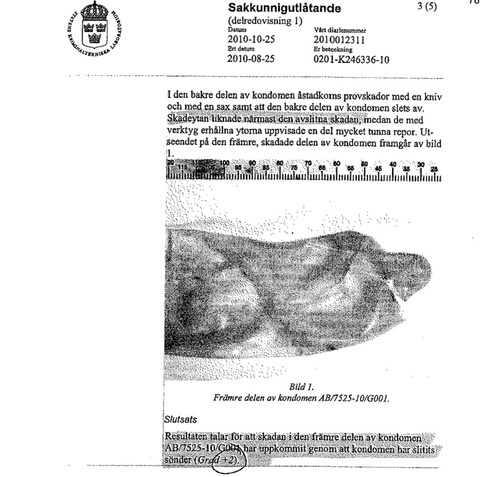
Most of the details above were never revealed to the public by global media organisations who rushed to condemn Assange as a "rapist" and a "fugitive from justice". The damage to Julian Assange’s reputation - and WikiLeaks' public standing - was huge, immediate, long-lasting, and monumentally distracting from their other work. As Assange later complained, normal Swedish protections of privacy were simply thrown out the door:
The press was immediately and unlawfully informed that there was a warrant for my arrest for the “rape of two” women. The Swedish government prosecutor unlawfully, and without any subsequent explanation or remedy, immediately confirmed to the press that there was a live warrant for my arrest. The prosecutor’s breach triggered an avalanche of news reports. Within days there were millions of references online which associated my name with the word 'rape'. Immediately the police accusations were used to attack WikiLeaks' work and my reputation as its publisher. US Defense Secretary Robert Gates celebrated the news of my arrest warrant with a smile, telling reporters that the arrest “sounds like good news to me”. Various twitter accounts officially associated with the Pentagon spread descriptions of me as a “rapist” and a “fugitive”.
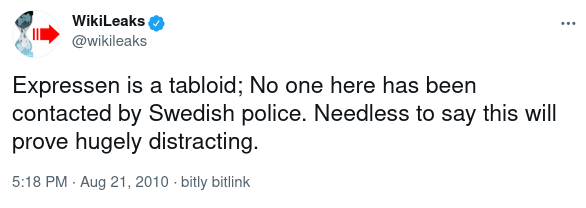
WikiLeaks attempted to push back against the avalanche of negative press. On 21 August they released an "official statement about the latest hot topic".
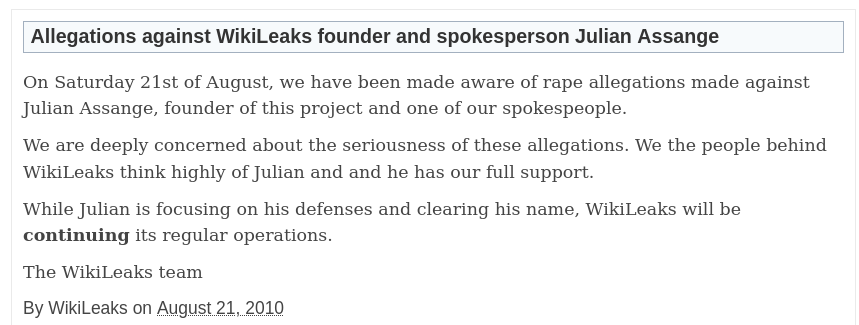
WikiLeaks also tweeted: "We were warned to expect 'dirty tricks.' Now, we have the first one." This tweet was later deleted, after complaints that it was not respectful to the women involved.
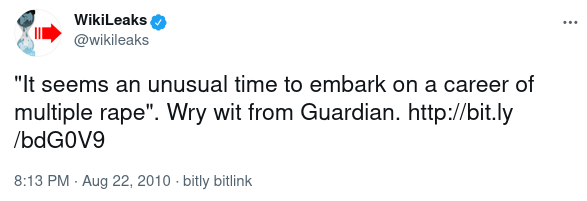
Facing a barrage of questions, the Swedish Prosecution Authority published a FAQ saying that Assange’s information had reached news media "in a way that the authority does not know" and the prosecutor’s office "merely confirmed the information". Observers wondered why prosecutors had not given journalists the standard "no comment" response.
Then another amazing thing happened. On the next day, Sunday 22 August 2010, the Swedish case against Assange was abruptly closed. Swedish authorities cancelled the warrant for Julian Assange’s arrest.
A statement from Chief Prosecutor Eva Finne on the Swedish Prosecution Authority website said Finne "has come to the decision that Julian Assange is not suspected of rape" and the arrest warrant against him has been withdrawn.
A former Swedish chief prosecutor, Sven-Erik Alhem, said the the actions of the prosecutors were "bizarre and confusing":
The arrest order was based on the assumption of probable cause, the strongest grade of suspicion of crime that is required for an arrest order, and later this probable cause suspicion is withdrawn without the appearence of any new information in the case.
In an equally bizarre TV interview, a spokeswoman for the Swedish Prosecution Authority insisted that no mistakes had been made and the case had been closed because "new evidence" had emerged. But while the arrest warrant had made global headlines, the "new evidence" supposedly proving Assange’s innocence was kept secret. Al Jazeera’s host asked if it was "normal procedure to accuse someone of rape and then two hours later say no, it’s not the case?"
In a 23 August 2010 interview with Al Jazeera, Julian Assange seemed similarly bemused.
"We were warned on the 11th by Australian intelligence that we would expect this sort of thing… It is clearly a smear campaign."
But a minute later Assange stated: "I did not say this was part of a smear campaign". And then moments later: "Clearly it is a smear campaign of some kind because the material was quickly dropped within six hours."
Meanwhile, according to the texts provided by Assange’s lawyers, Anna Ardin was urging Sofia Wilén to go public with her story so they could "shape public opinion" (the women’s identities were still secret: only Assange’s identity had been revealed). Ardin texted that they ought to sell their stories for money to a newspaper. Elections were being held in Sweden on 19 September 2010, and Ardin was (for the second time) seeking election to the Stockholm City Council as a Social Democrat party candidate. No doubt the extra publicity would have helped her campaign.
On 26 August, Chief Prosecutor Eva Finne repeated emphatically that the evidence provided did not constitute a crime and the case was closed:
“There is no suspicion of any crime whatsoever.”
Then another bizarre thing happened. The next day, Friday 27 August 2010, a full two weeks after Assange first had sex with Ardin, a high profile Social Democrat politician named Claes Borgström was appointed counsel for the two women: he applied to re-open the investigation with a new prosecutor in the Swedish city of Gothenberg (nearly 400 km from Stockholm). On the following day, the two women allegedly confirmed by text that their new lawyer had negotiated a contract with Sweden’s biggest tabloid.
Borgström was also running as a Social Democrat party candidate at the coming elections, and could have become a government cabinet member if his party had won (national and local elections are held simultaneously in Sweden). According to Rundle, Claes Borgström was "not only the Social Democratic Party’s gender equality spokesperson, but a major driver of Sweden’s Sexual Offences Act 2005". And the new prosecutor, Marrianne Ny, was a sex crime expert who "had headed a crime development unit whose brief was to explore ways in which sex crime law might be changed or extended". There were clearly political and career gains to be reaped from the high profile Assange case.
A fortnight later, on 1 September, Ny would not only announce that Wilén’s minor rape accusation had been reinstated, but another one had been added – the physical argy-bargy that Ardin had herself represented as consensual (if disliked) now made Assange liable to a charge of sexual coercion, another specifically Swedish ‘in-between’ law, perhaps comparable to indecent assault.
To successfully appeal a non-prosecution in Sweden is not unusual, but the coercion accusation surprised everyone. When journalists asked Borgström how the new accusations squared with earlier statements by the women that confirmed Assange was not a rapist, Borgström replied: “They’re not lawyers. They don’t know what rape is.” In Ardin’s case this was patently untrue. As gender equality officer at Uppsala University, she had literally written the book on the matter – redrafting the union’s gender equality manual.
Although WikiLeaks staff and media partners were still working on their next big release, Julian Assange cancelled his other commitments and remained in Sweden for five weeks, until 27 September 2010, when his lawyer said he had legal permission to leave the country. Nevertheless, for years to come, critics would falsely claim that Assange "fled Sweden to escape sex charges".
- NOTE
-
Arrest warrants were issued because Assange was wanted for questioning, but he was never actually "charged" by Sweden with any crime.
Assange gave an interview to Swedish police on 30 August 2010 in relation to Anna Ardin’s claim, which was the only remaining allegation at the time. On 8 September 2010, Bjorn Hurtig, Assange’s Swedish lawyer, confirmed that an investigation was still under way but his client had been given no summons for questioning, meaning Assange was free to do what he liked, including going abroad.
On the same day, the head of the Swedish military intelligence service (“MUST”) publicly denounced WikiLeaks in an article titled "WikiLeaks A Threat To Our Soldiers". Assange "became increasingly concerned about Sweden’s close relationship to the US in military and intelligence matters". A trusted intelligence source warned him that US intelligence agents had told their Swedish counterparts that intelligence-sharing arrangements could be cut off if Assange was given shelter.
"I considered my continued presence in Sweden to be a serious risk to my personal safety and a risk to WikiLeaks' continued publications. I asked my lawyer to request permission for me to leave Sweden to attend planned engagements."
Assange said the sex accusations were part of "a clear set-up" and had caused damage to WikiLeaks.
"This entire rape investigation has been conducted without my input," he complained.
Before leaving Sweden, Assange finalised the movement of WikiLeaks servers to the Pionen nuclear bunker. Bahnhof executive Jon Karlung said he was "proud to have clients like these."
"The Internet should be an open source for freedom of speech, and the role of an ISP is to be a neutral technological tool of access, not an instrument for collecting information from customers."
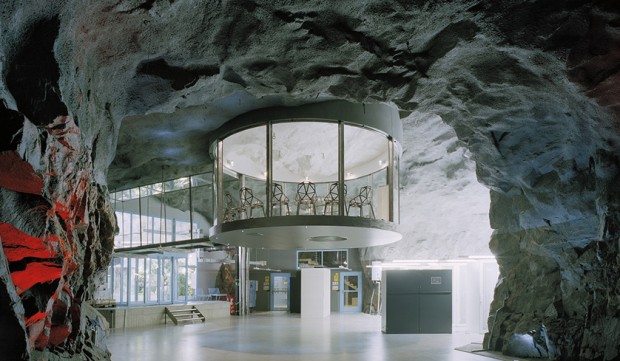
Julian Assange’s dramatic soujourn in Sweden had one final twist: when he finally boarded a flight from Sweden to Germany, his "suitcase, laptops, privileged attorney-client communications and other important information belonging to WikiLeaks disappeared". Assange later stated that the disappeared WikiLeaks material "included shocking evidence of a serious war crime; the massacre of more than sixty women and children by US military forces in Garani, Afghanistan".
Despite frantic efforts by many people over the following days, no trace of the disappeared luggage could be found, even though Assange still had a verified check-in docket. Airport staff said they had "never encountered anything like this before”. The luggage was not just lost; it appeared to have never existed in their systems.
Italian journalist and long-time WikiLeaks partner Stefania Maurizi, who had a scheduled meeting in Berlin with Assange, later described how he arrived very late from the airport with just a single laptop, a USB stick, and a plastic bag containing a T-shirt, soap and a toothbrush. The next day at an internet cafe they signed an agreement, witnessed by Kristinn Hrafnsson, and Assange gave Maurizi a copy of the Afghan War Logs files. Then Assange got a phone call from his Swedish lawyer:
"Why didn’t they interrogate me before?" he said. "I was in Sweden for 6 weeks."
*
Assange continued flying from Germany to London, where he continued preparing for the Iraq War Logs release.
On 18 November 2010, the new Swedish Prosecutor Marianne Ny ordered the detention of Julian Assange "with probable cause, suspected of rape, three cases of sexual molestation and illegal coercion". A European Arrest Warrant was issued. Although Assange had been interviewed by Swedish police, had remained in Sweden for a month after Marianne Ny took over the case, and had left the country because he was not summoned by Ny for questioning, the Swedish Prosecuting Authority insisted that a new warrant was required "as it has been impossible to interview him during the investigation".
- NOTE
-
Assange’s Swedish lawyer later said that Assange had "made himself available to speak with Swedish authorities, including the prosecutor handling the case, at an embassy abroad, but this offer had been rejected". Assange had earlier "offered to travel to Sweden to answer questions but authorities could not make themselves available at any of the suggested times".
Astonishingly, Sweden also issued an Interpol Red Notice.
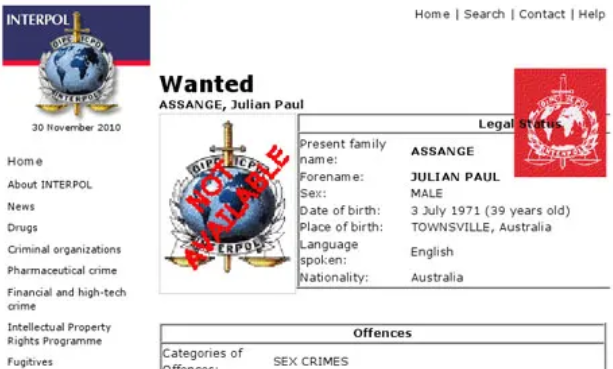
Dated 30 November, the entry reads: "SEX CRIMES" and says the warrant has been issued by the international public prosecution office in Gothenburg, Sweden. "If you have any information contact your national or local police." It reads: "Wanted: Assange, Julian Paul," and gives his birthplace as Townsville, Australia.
Assange’s lawyers appealed the Swedish arrest warrant all the way to the Sweden’s Supreme Court, arguing that there was no such thing as "minor rape", that "rape" was a mistranslation of the Swedish terminology, and that the allegations did not meet English or European legal definition of "rape". But the Swedish Supreme Court refused to hear Assange’s case.
Legal observers wondered why Sweden did not simply go and question Assange in Britain, as happened frequently in such European Arrest Warrant cases. The simple answer may be that UK Crown Prosecutors, then headed by Director of Public Prosecutions Keir Starmer, advised them to stay away.
A Freedom of Information request in Sweden, lodged by Italian journalist Stefania Maurizi, later revealed that a lawyer for the UK Crown Prosecuting Service, Paul Close, "had, unaccountably, advised the Swedes in 2010 or 2011 not to visit London to interview Assange". Close wrote to the Swedish prosecutors on 25 January 2011:
“My earlier advice remains, that in my view it would not be prudent for the Swedish authorities to try to interview the defendant in the UK”.
It’s not clear when this "earlier advice" was provided, or what exactly it said. But on 13 January 2011 Close wrote:
“Please do not think that the case is being dealt with as just another extradition request”.
In yet another astonishing turn of events, all Paul Close’s correspondence about Assange with Swedish prosecutors was mysteriously deleted when he retired in 2014. The Swedish government also destroyed further correspondence between the Swedish Prosecution Authority and the UK Crown Prosecution Service (as another FOI request from Stefania Maurizi later revealed: both the Swedish Court of Appeal and the Swedish Parliamentary Ombudsmen rejected her requests and refused to provide an explanation).
It seems quite possible that UK Crown Prosecutors were telling Sweden not to come and question Assange in London from the day they issued a European Arrest Warrant. And yet for years Assange was publicly condemned by British MPs (and many others) for refusing to go to Sweden, where he would have been immediately jailed and most likely quickly extradited to the USA, who had a sealed indictment waiting.
- NOTE
-
Assange repeatedly offered to go to Sweden to be interviewed, provided that he was given assurances that he would not be "onward extradited" to the USA. Sweden refused to give that assurance. Sweden has a history of near-total compliance with US extradition requests and has assisted with CIA renditions and torture.
*
*
The author of this book can be found on Twitter: @Jaraparilla
*
Home - Genesis - 2007 - 2008 - 2009 - Early 2010 - Mid 2010 - Late 2010 - End 2010 - Early 2011 - Mid 2011 - Late 2011 - End 2011 - Early 2012 - Late 2012 - Early 2013- Late 2013 - 2014 - 2015 - Early 2016 - Late 2016 - 2017-19
Copyright Gary Lord 2021, 2022, 2023